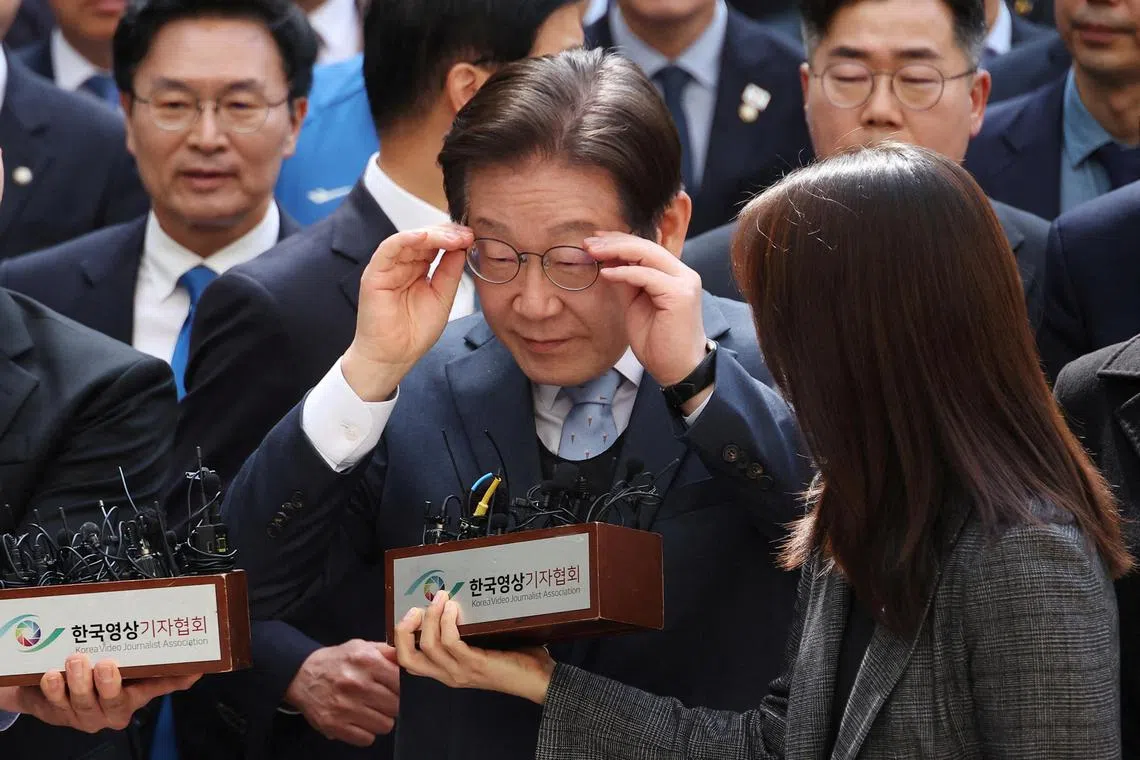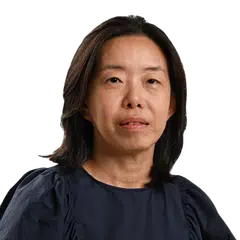News analysis
Acquittal clears hurdle in South Korea opposition leader Lee Jae-myung’s presidential bid
Sign up now: Get insights on Asia's fast-moving developments

South Korean opposition leader Lee Jae-myung is the front runner to replace suspended President Yoon Suk Yeol if the latter’s impeachment is upheld.
PHOTO: REUTERS
Follow topic:
SEOUL - South Korean opposition leader Lee Jae-myung is one very relieved man.
Mr Lee, the front runner to replace suspended President Yoon Suk Yeol if the latter’s impeachment is upheld, had risked having his ambitions cut short after a district court found him guilty of violating election laws
Under South Korean law, he stood to lose his legislative seat and be barred from running in elections for five years if he was sentenced to jail, or received a penalty fine that exceeds one million won (S$910).
However, on March 26, Mr Lee’s earlier guilty verdict was overturned by the Seoul High Court,
Mr Lee, 62, had been accused of making a false statement during a parliamentary audit in October 2021 about land rezoning in Seongnam city. He was mayor of the city located south-east of Seoul from 2010 to 2018.
He was also accused of denying, in a media interview, personal ties to a central figure in a property redevelopment scandal when he was Seongnam mayor.
Speaking to reporters after his acquittal, the leader of the opposition Democratic Party (DP), which controls South Korea’s National Assembly, thanked the court for a “proper ruling based on truth and justice”, as supporters cheered.
The acquittal not only clears a major hurdle in the path of Mr Lee’s presidential ambitions, but may also boost his chances, said Yonsei University’s Dr Bong Young-shik.
Mr Lee, a lawyer by training, was the DP’s presidential candidate in 2022 but lost to Mr Yoon
The country’s Constitutional Court is due to announce in the coming days its decision over the impeachment of Mr Yoon by the National Assembly for his ill-fated martial law declaration on Dec 3, 2024. If the court upholds the impeachment, a snap presidential election has to be called within 60 days.
A Gallup Korea opinion poll released on March 25 showed Mr Lee’s approval rating at 36 per cent, followed in a distant second place by Employment and Labour Minister Kim Moon-soo, a staunch Yoon supporter, at 9 per cent.
Dr Bong drew parallels between Mr Lee’s case and that of US President Donald Trump. In March 2024, the US Supreme Court overturned a lower court’s ruling
Mr Trump went on to win the presidential race in November 2024
“That Supreme Court’s decision helped to boost Mr Trump’s popularity, with him arguing that he had been the victim of ‘the weaponisation of the legal system’. Mr Lee can very well make such a similar argument, portraying himself as a victim like Mr Trump did,” Dr Bong told The Straits Times.
South Korean prosecutors have announced that they would be raising Mr Lee’s acquittal to the Supreme Court for a final judgment. But Dr Bong thinks that any change in the outcome, “while possible, will be most shocking”.
He sees the High Court’s decision to acquit Mr Lee as a move to emphasise the separation of politics from the court.
“The court has made it clear that it holds a very high standard in defining what are considered election law violations, which hold a critical key to politicians’ eligibility to run in elections. The false statements that Mr Lee was accused of making are of a political nature, which should therefore be judged by the public during elections, and not by the court,” said Dr Bong.
Professor Leif-Eric Easley at Ewha Womans University shared a similar assessment, and saw the court’s decision as a move to “unwind the lawfare of the past three years to allow South Korea’s political crisis to be resolved by an election rather than by the courts”.
While the acquittal has removed “a significant challenge to his potential presidential candidacy”, Sogang University Graduate School of International Studies Associate Professor Hannah Kim pointed out that the legal noose remains around Mr Lee’s neck, given his other pending cases.
He is facing four other criminal charges for inducing a witness to commit perjury, alleged involvement in land corruption deals when he was Seongnam mayor, as well as illegal transfers of funds to North Korea and embezzlement of public funds when he was governor of Gyeonggi province from 2018 to 2021.
Most of these cases are still in the early stages of trial hearings, but Mr Lee is due back in court on March 30 for the final trial hearing of the perjury inducement case, with the verdict expected by November.
Even though these cases are less of a threat, said Prof Kim, how they proceed can still influence public sentiment towards Mr Lee and his party.
Warning that the acquittal is not a free pass to the presidency, she said: “Mr Kim and the party will still need to tread carefully and avoid overreaching on issues that could potentially backfire.”
Wendy Teo is The Straits Times’ South Korea correspondent based in Seoul. She covers issues concerning the two Koreas.


